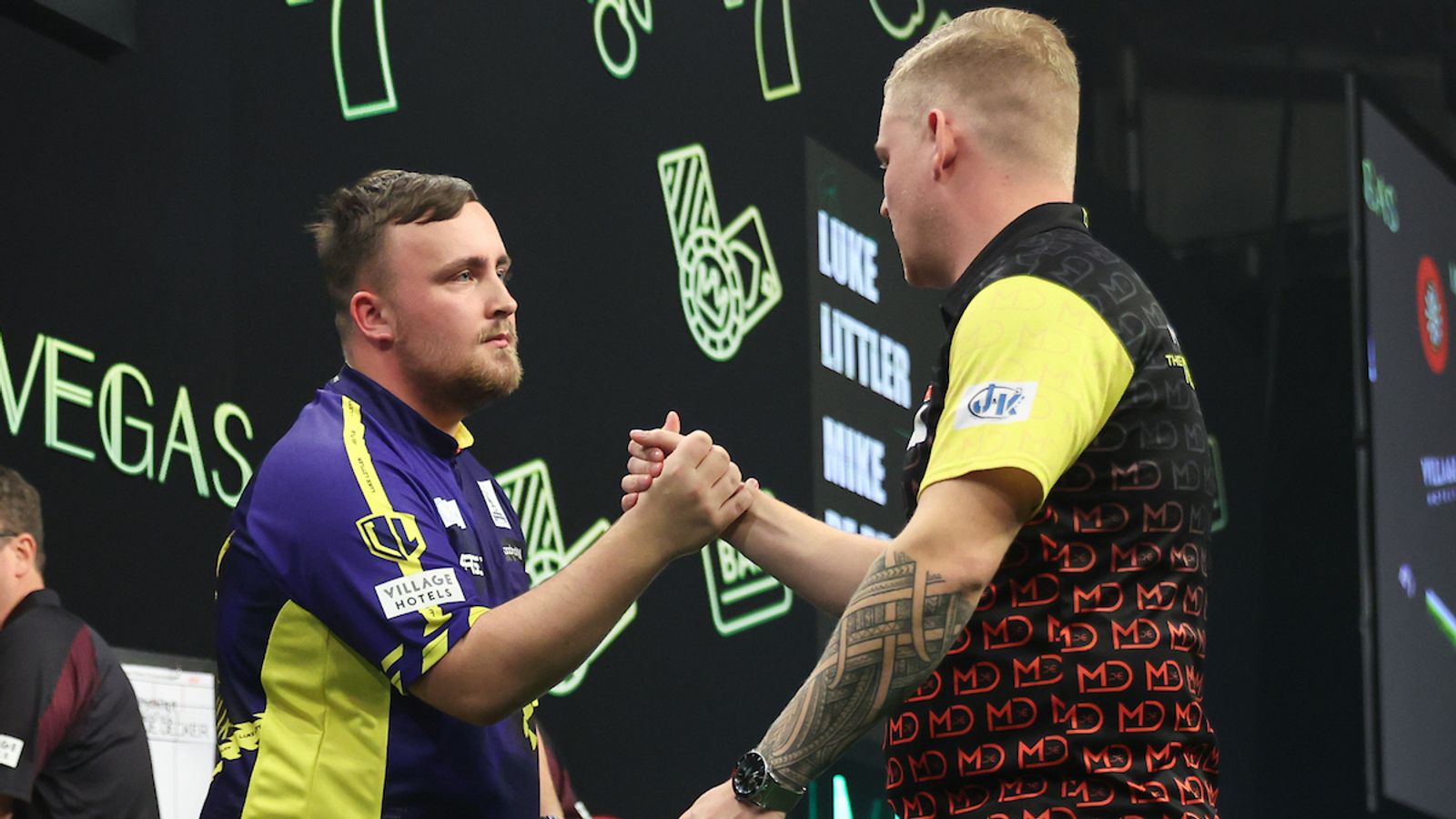
The issue of fans whistling at darts players has once again sparked controversy, with Mike De Decker becoming the latest target of unruly crowd behavior during his Grand Slam of Darts last-16 match against teenage sensation Luke Littler. Throughout the tense encounter in Wolverhampton, De Decker faced audible whistling from the crowd, particularly when throwing doubles. Despite his appeals to match officials to address the disruption, his request was met with inaction.
De Decker, visibly frustrated, found himself just one leg away from victory before Littler mounted an incredible comeback. The 17-year-old’s resilience earned him a dramatic 10-9 victory, securing his place in the quarter-finals. Following the match, De Decker voiced his concerns in an interview with Viaplay, questioning the referee’s role: “Why is he there then? He’s the referee!”
The incident reignited a broader debate about the growing problem of crowd interference in darts. Sky Sports Darts reporter Abigail Davies took to social media to denounce the behavior, emphasizing how it tarnishes the sport. “Whistling at darts tournaments has to be stopped, surely they can’t profess to be real darts fans?” she wrote on X (formerly Twitter). Davies sympathized with De Decker while acknowledging Littler’s impressive performance: “The comeback from Littler was spectacular but I genuinely feel for De Decker. Sick of it being a blight on our sport. Cheer for your favorite but don’t actively put someone off.”
Match referee Kirk Bevins echoed Davies’ sentiment, highlighting the challenges of addressing disruptive crowds. In a reply on X, he stated, “Hear hear. The crowd just gets worse when referees address the crowd. John McDonald even addressed the crowd in the break once regarding this and they got worse. If you see someone whistling, report it to security and get them kicked out.” Bevins’ comments reflect the difficulties officials face in maintaining order, especially when crowd behavior seems to intensify in response to intervention.
From Littler’s perspective, the crowd’s behavior was palpable. As the 17-year-old reflected on his comeback victory, he acknowledged the dynamic atmosphere in Wolverhampton. “A few times they were singing there is only one Luke Littler,” he noted. “I just couldn’t find what they wanted; I couldn’t find that two, three-treble visit. But at 9-7, I just thought to myself, ‘you have got nothing to lose,’ so try and get back at him and I got one back, and the crowd obviously they were on his back even worse. Then I just took full advantage.”
The atmosphere surrounding darts events, especially major tournaments, has long been known for its vibrancy and passion. However, when that passion crosses the line into deliberate attempts to distract players, it raises questions about fairness and sportsmanship. Sky Sports’ Megan Wellens, reporting from Wolverhampton, described the situation as the “harsh reality of the current darts climate.” She pointed out that whistling and other forms of crowd interference are not new to the sport, noting that they often occur during high-profile tournaments.
“We have seen Michael Smith and Luke Humphries fume during their Premier League matches against Luke Littler in Cardiff, while Littler himself had to deal with the crowd in Aberdeen,” Wellens observed. The disruptive behavior was notably evident during Littler’s match against De Decker, as the crowd began to whistle when De Decker attempted crucial doubles. “Players have said for a long time it is off-putting but it is difficult to control a crowd,” Wellens added, drawing a parallel to football matches where players face similar challenges when taking penalties. “It is a topic of conversation that will continue on but at this time of the year, lots of players are going to have to deal with it.”
The growing prevalence of disruptive crowd behavior in darts raises important questions about the future of fan conduct in the sport. While passionate support is an integral part of the atmosphere, ensuring that it does not undermine the integrity of the competition is a delicate balancing act. For players like De Decker, the experience serves as a harsh reminder of the mental fortitude required to compete at the highest level. Littler’s victory, impressive as it was, will be remembered not only for his skill but also for the controversy surrounding the crowd’s role.
As darts continues to grow in popularity, tournament organizers, officials, and fans must work together to strike a balance that preserves the excitement of the sport while maintaining respect for all competitors. Ensuring fair play and providing a supportive but respectful environment will be key to the sport’s continued success. Whether through stricter enforcement of crowd conduct rules, increased security measures, or educational campaigns aimed at fans, finding a solution to this recurring issue is essential for the integrity and growth of darts on the world stage.
Leave a Reply